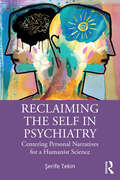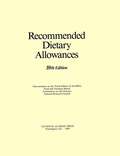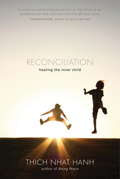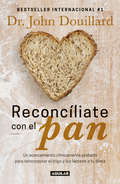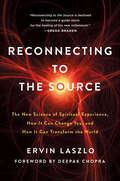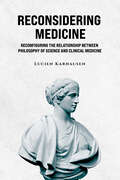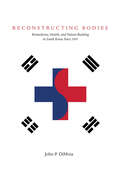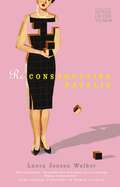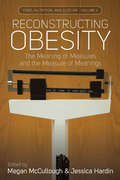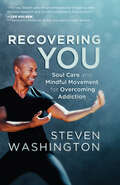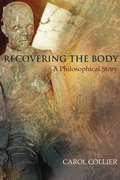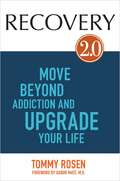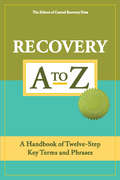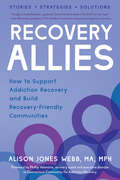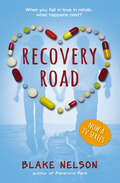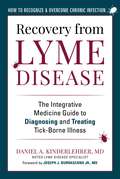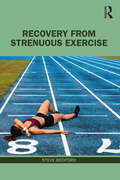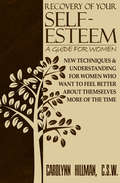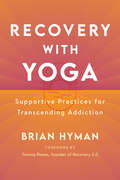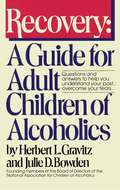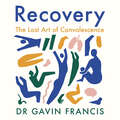- Table View
- List View
Reclaiming the Self in Psychiatry: Centering Personal Narratives for a Humanist Science
by Şerife TekinReclaiming the Self in Psychiatry: Centering Personal Narratives for Humanist Science diagnoses the fundamental problem in contemporary scientific psychiatry to be a lack of a sophisticated and nuanced engagement with the self and proposes a solution—the Multitudinous Self Model (MuSe).MuSe fulfils psychiatry’s twin commitments to patients’ flourishing and scientific objectivity. Marshalling the conceptual and empirical resources from testimonies from individuals diagnosed with mental disorders, substantive research in cognitive science, and empirically informed philosophy, MuSe provides clinicians, scientists, and patients pathways to respond to mental distresses and disorders. This framework boosts psychiatry’s relationship to science by facilitating expansive notions of expertise and objectivity in which some patients are recognized as “experience-based experts” whose contributions to psychiatric knowledge are indispensable. Şerife Tekin draws the contours of a future for psychiatry that is grounded in philosophy, medical humanities, and social sciences as much as physiology and neuroscience.This book is an ideal read for professional psychiatrists and philosophers of psychiatry who are interested in the philosophy of mental health.
Recognition and Alleviation of Pain in Laboratory Animals
by National Research Council of the National AcademiesThe use of animals in research adheres to scientific and ethical principles that promote humane care and practice. Scientific advances in our understanding of animal physiology and behavior often require theories to be revised and standards of practice to be updated to improve laboratory animal welfare. Recognition and Alleviation of Pain in Laboratory Animals, the second of two reports revising the 1992 publication Recognition and Alleviation of Pain and Distress in Laboratory Animals from the Institute for Laboratory Animal Research (ILAR), focuses on pain experienced by animals used in research. This book aims to educate laboratory animal veterinarians; students, researchers and investigators; Institutional Animal Care and Use Committee members; and animal care staff and animal welfare officers on the current scientific and ethical issues associated with pain in laboratory animals. It evaluates pertinent scientific literature to generate practical and pragmatic guidelines for recognizing and alleviating pain in laboratory animals, focusing specifically on the following areas: physiology of pain in commonly used laboratory species; pharmacologic and non-pharmacologic principles to control pain; identification of humane endpoints; and principles for minimizing pain associated with experimental procedures. Finally, the report identifies areas in which further scientific investigation is needed to improve laboratory animal welfare.
Recommended Dietary Allowances (10th edition)
by Subcommittee on the Tenth Edition of the RDAs National Research CouncilSince its introduction in 1943, "Recommended Dietary Allowances" has become the accepted source of nutrient allowances for healthy people. These Recommended Dietary Allowances (RDAs) are used throughout the food and health fields. Additionally, RDAs serve as the basis for the U.S. Recommended Daily Allowances, the Food and Drug Administration's standards for nutrition labeling of foods. The "10th Edition" includes research results and expert interpretations from years of progress in nutrition research since the previous edition and provides not only RDAs but also "Estimated Safe and Adequate Daily Dietary Intakes" - provisional values for nutrients where data were insufficient to set an RDA. Organized by nutrient for ready reference, the volume reviews the function of each nutrient in the human body, sources of supply, effects of deficiencies and excessive intakes, relevant study results, and more. The volume concludes with the invaluable "Summary Table of Recommended Dietary Allowances," a convenient and practical summary of the recommendations.
Reconciliation
by Thich Nhat HanhBased on Dharma talks by Zen Master Thich Nhat Hanh and insights from participants in retreats for healing the inner child, this book is an exciting contribution to the growing trend of using Buddhist practices to encourage mental health and wellness. Reconciliation focuses on the theme of mindful awareness of our emotions and healing our relationships, as well as meditations and exercises to acknowledge and transform the hurt that many of us experienced as children. The book shows how anger, sadness, and fear can become joy and tranquility by learning to breathe with, explore, meditate, and speak about our strong emotions. Reconciliation offers specific practices designed to bring healing and release for people suffering from childhood trauma. The book is written for a wide audience and accessible to people of all backgrounds and spiritual traditions.
Reconciliation: Healing the Inner Child
by Thich Nhat HanhBased on Dharma talks by Zen Master Thich Nhat Hanh and insights from participants in retreats for healing the inner child, this book is an exciting contribution to the growing trend of using Buddhist practices to encourage mental health and wellness. Reconciliation focuses on the theme of mindful awareness of our emotions and healing our relationships, as well as meditations and exercises to acknowledge and transform the hurt that many of us experienced as children. The book shows how anger, sadness, and fear can become joy and tranquility by learning to breathe with, explore, meditate, and speak about our strong emotions. Reconciliation offers specific practices designed to bring healing and release for people suffering from childhood trauma. The book is written for a wide audience and accessible to people of all backgrounds and spiritual traditions.
Reconcíliate con el pan
by John Douillard¿Llevas una dieta libre de gluten y lácteos? Es probable que no sea necesario. Eliminar el trigo y los productos lácteos de tu dieta es sólo una solución temporal: Reconcíliate con el pan brinda un acercamiento clínicamente probado para reincorporar estos alimentos de manera natural y sana. Con el respaldo de más de 600 estudios científicos y su experiencia como médico Ayurveda, el doctor John Douillard ha descubierto cómo un colapso en la digestión puede dañar la pared intestinal y filtrar los alimentos no digeridos y las toxinas ambientales en el sistema linfático del cuerpo, causando síntomas de "cerebro de pan" y alergias alimentarias. La causa más común de los malestares o trastornos digestivos es el abuso de ingredientes procesados en los alimentos; por ejemplo, aquellos encontrados en el pan dulce. Los panes que contienen azúcar refinada, conservadores y químicos artificiales provocan trastornos tales como la inflamación en nuestro tracto digestivo. En cambio, los que son de harina integral nos aportan una cantidad de fibra útil para regularnos. Entre muchas cosas, este libro te ayudará a: -Regresar a un sistema digestivo sano. -Limpiar los ganglios linfáticos congestionados relacionados con los síntomas de la intolerancia alimentaria. -Seguir los ciclos circadianos digestivos naturales. -Equilibrar tu nivel de azúcar en la sangre. -Adoptar técnicas de ejercicio y de desintoxicación probadas para reiniciar la digestión y lograr una salud y vitalidad óptimas.
Reconnecting to the Source: The New Science of Spiritual Experience, How It Can Change You, and How It Can Transform the World
by Ervin LaszloRenowned authority on science and philosophy Dr. Ervin Laszlo explores the implications of the new quantum sciences to move beyond the of limits of reality as we know it—and find our way again in our “in-formed,” purposively evolving universe.Reconnecting to the Source is a powerful new book on the science of spiritual experience by Dr. Ervin Laszlo. A well-known figure in the fields of new science, consciousness, and spirituality, Dr. Laszlo has inspired some of today’s most important figures in science and philosophy. In Reconnecting to the Source he unpacks the science behind spiritual experience, investigating the ways in which we can access realms of experience beyond the everyday. It is in these moments, when our conscious minds are in contact or perhaps even overridden by our unconscious selves, that we can explore the depths of spiritual meaning. In addition to a foreword by Deepak Chopra, the book includes new, never before published contributions from a long list of well-known writers and public figures—including Jane Goodall, Barbara Marx Hubbard, Zhi-Gang Sha and many more. Each contributor has written about a unique spiritual experience of their own, sharing moments in their lives that are outside of the boundaries of the usual and reflecting on the importance of these moments. This revolutionary and powerful book will challenge you to reconsider the boundaries of our own experience and change how we look at the world around us. It is a unique, never before available resource for people who want to know how they can consciously align with the forces and “attractors” that governs the universe, and brought us, living, conscious people on the scene in the great processes of evolution that unfold here on Earth.
Reconsidering Law and Policy Debates
by John G. CulhaneThis book offers fresh approaches to a variety of social and political issues that have become highly polarized and resistant to compromise by examining them through a population-based public health perspective. The topics included are some of the most contentious: abortion and reproductive rights; end-of-life issues, including the right to die and the treatment of pain; the connection between racism and poor health outcomes for African-Americans; the right of same-sex couples to marry; the toll of gun violence and how to reduce it; domestic violence and how the criminal justice model fails to deal with it effectively; and how tort compensation and punitive damages can further public health goals. People at every point along the political spectrum will find the book enlightening and informative. Written by eight authors, all of whom have cross-disciplinary expertise, this book shifts the focus away from the point of view of rights, politics, or morality and examines the effect of laws and policies from the perspective of public health and welfare.
Reconsidering Medicine: Reconfiguring the Relationship Between Philosophy of Science And Clinical Medicine
by Lucien KarhausenThis is an original book on the philosophy of medicine. It considers philosophy of medicine as a subdiscipline of philosophy of science. This volume is grounded on an epistemological bottom-up account that arises from the clinical situation, the epidemiologic, and the resulting public health account. It is not a review of the literature, and it is not intended to frame the debates, or to analyze and compare the various number of viewpoints.Medicine is the human activity, which begins by a linguistic act that identifies the negative norms of health: it begins with a first distinction that splits biological processes into three conventional parts, normal, abnormal and pathologic. Neither of them is a natural kind. Being abnormal is intrinsically bad and admits of degrees, while being pathologic is dichotomous. Being normal is factitious and counterfactual much the same as frictionless planes in physics. Leaving apart the ethical aspects, this book endeavors to uncover the implicit conceptual network, the chief junctures of medicine, should they be found, and their articulations with clinical and community medicine. It results that medicine is pervaded with dichotomous concepts such as scientific vs pragmatic discourse, function and malfunction, abnormal and pathologic, needs and wants, causation and explanation, clinical vs community-oriented care, physical vs psychiatric diseases, mental illness vs deviancy, and so on. Medical thinking has two dimensions intrinsically interweaved, namely a constant amalgam and admixture of biological and normative aspects, so that this essential hybrid nature of the grammar of medicine endorses opposite approaches, naturalistic or normativist, biological or value-laden, realist or instrumental, reductionist or holistic, phenomenological or analytic.
Reconstructing Bodies: Biomedicine, Health, and Nation-Building in South Korea Since 1945
by John P. DimoiaSouth Korea represents one of the world's most enthusiastic markets for plastic surgery. The growth of this market is particularly fascinating as access to medical care and surgery arose only recently with economic growth since the 1980s. Reconstructing Bodies traces the development of a medical infrastructure in the Republic of Korea (ROK) from 1945 to the present, arguing that the plastic surgery craze and the related development of biotech ambitions is deeply rooted in historical experience. Tracking the ROK's transition and independence from Japan, John P. DiMoia explains how the South Korean government mobilized biomedical resources and technologies to consolidate its desired image of a modern and progressive nation. Offering in-depth accounts of illustrative transformations, DiMoia narrates South Korean biomedical practice, including Seoul National University Hospital's emergence as an international biomedical site, state-directed family planning and anti-parasite campaigns, and the emerging market for aesthetic and plastic surgery, reflecting how South Koreans have appropriated medicine and surgery for themselves as individuals, increasingly prioritizing private forms of health care.
Reconstructing Natalie (Women Of Faith Ser.)
by Laura Jensen WalkerNatalie faces breast cancer with her friends, humor, girlfriends, and is a survivor. This is a story full of laughter, tears, hope and humor....<P><P> Natalie Moore is having a great time living her life until she confronts something that too many women fight in today's society: breast cancer. At twenty-seven years old, Natalie walks us through the emotions and reality of having breast cancer while she loses her boyfriend, her fair, and both of her breasts. She also shows us how to cope, as she makes new friends, gets reconstructive surgery that even enhances her figure, finds new love in unexpected places, and makes major changes in her life. Natalie learns to place importance in people in attributes other than the obvious and physical as she works on reconstructing herself.
Reconstructing Obesity
by Jessica A. Hardin Megan B. McculloughIn the crowded and busy arena of obesity and fat studies, there is a lack of attention to the lived experiences of people, how and why they eat what they do, and how people in cross-cultural settings understand risk, health, and bodies. This volume addresses the lacuna by drawing on ethnographic methods and analytical emic explorations in order to consider the impact of cultural difference, embodiment, and local knowledge on understanding obesity. It is through this reconstruction of how obesity and fatness are studied and understood that a new discussion will be introduced and a new set of analytical explorations about obesity research and the effectiveness of obesity interventions will be established.
Recovering You: Soul Care and Mindful Movement for Overcoming Addiction
by Steven WashingtonA UNIQUELY HOLISTIC AND JOYFUL APPROACH TO BREAKING FREE FROM ADDICTION AND COMPULSION Substance abuse issues have worsened dramatically in recent years, with alcohol and drug addiction soaring. Our collective anxiety also shows up in many other insidious ways — from overeating to mindless scrolling to excessive online spending and more. Whether you are on the path of recovery, taking your first step in that direction, or simply feeling adrift and unmoored, Recovering You offers a lifeline to the discovery of a new and better way of being. Steven Washington shares his story of growing up around alcoholism and going into recovery for his own drug and alcohol addiction. But the heart and soul of this book is his process of guiding readers through fear, shame, and regret and into community and gratitude. Self-massage, breathing, meditation, and, uniquely, a focus on qigong — the ancient movement practice at the heart of Chinese medicine and Taoist philosophy — liberate, energize, and soothe. Washington designed this book to cast a warm and clarifying light on what you most need to care for your body and soul.
Recovering the Body: A Philosophical Story
by Carol CollierFollowing the metaphysical and epistemological threads that have led to our modern conception of the body as a machine, the book explores views of the body in the history of philosophy. Its central thesis is that the Cartesian paradigm, which has dominated the modern conception of the body (including the development and practice of medicine), offers an incomplete and even inaccurate picture. This picture has become a reductio ad absurdum, which, through such current trends as the practice of extreme body modification, and futuristic visions of downloading consciousness into machines, could lead to the disappearance of the biological body. Presenting Spinoza’s philosophy of the body as the road not followed, the author asks what Spinoza would think of some of our contemporary body visions. It also looks to two more holistic approaches to the body that offer hope of recovering its true meaning: the practice of yoga and alternative medicine. The metaphysical analysis is accompanied throughout by a tripartite historical and epistemological analysis: the body as an obstacle to knowledge (exemplified by Plato and our modern-day futurists), the body as an object of knowledge (exemplified by Descartes and modern scientific medicine); and the body as a source of knowledge (exemplified by the Stoics, and the philosophy of yoga). - This book is published in English.
Recovery 2.0: Move Beyond Addiction And Upgrade Your Life
by Tommy RosenThrough more than 20 years of recovery from addiction, noted yoga teacher Tommy Rosen learned a lot about what works and what doesn't work in recovery. From his explorations on the yoga mat and in 12-Step rooms, he found a path to sustainable recovery that includes mind-body practices, a profound look at diet, and a more holistic and inclusive perspective on the 12 Steps. This led him to realize that recovery happens in stages, and that by utilizing the best practices of the 12 Stepsin combination with yoga and meditation, he could achieve lasting freedom from addiction. In Recovery 2. 0, Tommy shares his own past struggles with addiction and the powerful insights that helped him to identify and break free from the obstacles that stand in the way of recovery. Building off the key tenets of the 12-Step program, he lays out an innovative approach where deeper levels of detoxification and transformation allow you to uproot addiction and thrive. In these pages, you'll find: A new way of looking at addiction as a vibratory frequency that has roots in family history and one's "Addiction Story," which helps to destigmatize addiction and remove associated guilt and shame. Fresh perspectives on how to get the most out of the 12-Step teachings and community, while avoiding pitfalls. Daily practices in breathing, meditation, and yoga that will give you access to the extraordinary power within you. A pathway to a newer, healthier relationship with food designed to boost immunity, increase vitality, support recovery, and prevent relapse. Inspiration to help you discover your personal mission and be of service to others. The point is not to survive addiction. The point is to thrive in recovery and live a life second to none.
Recovery A to Z
by The Editors of Central Recovery PressRecovery A to Z (Second Edition) is the perfect reference for anyone in the twelve-step community. Contains useful and relevant meeting and fellowship etiquette. Loaded with FAQs and general facts regarding various twelve-step recovery programs. User-friendly format with definitions of words, phrases, and slogans common to the community. Updated resource listing appeals to an even broader audience.
Recovery Allies: How to Support Addiction Recovery and Build Recovery-Friendly Communities
by Alison Jones WebbFor readers of The Least of Us and In the Realm of Hungry Ghosts--a practical, hopeful, and research-based guide for supporting loved ones through addiction and recovery. This isn&’t a book about addiction--it&’s a book about recovery. Written for every loved one, community member, and recovery professional who wants to know &“how do I help?,&” Recovery Allies offers real-world solutions, evidence-based strategies, and, above all, hope for the 23 million Americans living in recovery from substance use disorder. Other books describe how to treat addiction or offer stories of recovery and redemption, but this is the first to comprehensively approach our addiction crisis from a community perspective. You&’ll learn about:Reducing the shame and stigma that can prevent folks in recovery from asking for helpThe tools essential to addressing our addiction epidemicHow to apply public health strategies across all community sectors, from healthcare and law enforcement to faith organizations and educationThe critical role of relationships and community support in achieving sobriety and maintaining recoveryRelapse prevention, harm reduction, and peer support Recovery Allies is structured around the key pillars of recovery as identified by the Substance Abuse and Mental Health Services Administration (SAMHSA): home, health, purpose, and community. It shows you a different way to think about addiction in our country--and what you can do to help in all your spheres of influence. Most adults with substance use disorder don&’t receive specialized treatment like counseling, medication, or rehab. Instead, the recovery journey starts in their communities, among family and friends--here and now, with their recovery allies.
Recovery Road
by Blake NelsonNOW A TV SERIES ON FREEFORM"An intriguing look at the aftermath of addiction." --Los Angeles TimesMadeline has a drinking problem and anger issues, so she's sent away to Spring Meadows, a rehab center in a row of rehab centers known as Recovery Road. On a weekly movie night in town she meets Stewart, who's dealing with demons of his own. It's an intense time, and the two of them come together intensely.When Madeline gets out of rehab, she tries to get back on her feet, and waits for Stewart to join her. When he does, though, it's not the ideal reunion that Madeline has dreamed of. Both of them still have serious problems. And love seems more like a question than an answer.True and insightful, Recovery Road is a story about finding the right person at the worst possible time. And loving that person anyway. No matter what.
Recovery from Lyme Disease: The Integrative Medicine Guide to Diagnosing and Treating Tick-Borne Illness
by Daniel A. KinderlehrerFrom the foreword by world-leading Lyme expert Joseph J. Burrascano, Jr., MD:A detailed and thoughtful road-map is sorely needed. And it is in this context that I am so pleased that we have this book by Dr. Kinderlehrer. I wish I had had a book like this back in the day to guide me! It covers just about everything—the infections, diagnostic tests, treatments, and yes, the all-important terrain. It gives the reader an in-depth, but easily understandable, guide through the many subtleties of tick-borne illnesses. One is impressed with the knowledge presented and grateful for this information which has helped so many people recover from chronic illness. To anyone touched by tick-borne diseases, be they a patient, a caregiver or loved one, or health practitioner, this book is a must-read. It will serve as a continuing reference as it gets read and reread to assimilate all it has to offer. I congratulate Dr. Kinderlehrer and thank him for this most impressive work.The ultimate guide to recognizing, coping with, and overcoming chronic infection. Lyme Disease is a substantial problem. While the CDC reported 427,000 new cases in 2017 based on surveillance criteria, actual numbers based on clinical diagnosis put that number at over one million. It is now well accepted that 10 to 20 percent of these cases go on to become a chronic illness, and these numbers don't even include those people who became chronically ill without ever witnessing a tick attachment or a bulls-eye rash. In other words, hundreds of thousands of people develop a chronic illness every year. This is why Dr. Dan Kinderlehrer&’s book is so important and timely and has the potential to help millions who are victims of this epidemic. His integrative approach offers the most up-to-date and comprehensive plan available for treating and beating this disease. It will discuss brand new treatments such as disulfiram, which is being hailed as a major breakthrough, as well as the use of cannabis to treat pain and anxiety, among other developments in the field. With the staggering growth we are seeing in numbers of people afflicted, this book becomes more important every day. Kinderhlehrer is in a unique position to write this book. After completing a residency in Internal Medicine in 1979, he opened one of the first practices in the US in what was then called Holistic Medicine. After becoming an expert in nutrition and environmental illness, he became ill himself with Lyme disease complex. His long road to recovery has given him insights into what patients are going through; his background in internal medicine trained him to understand the complexities of his multi-systemic illness; his knowledge of environmental illness has enabled him to evaluate immune dysregulation; and his study of energetic medicine, spiritual alignment, and healing from trauma has yielded insights into how to help patients shift their belief systems to being well. Recovery from Lyme Disease is by far the most thorough book available on Lyme Disease Complex. It will provide patients with information that will guide them on their healing journeys, as well as supplying doctors with instruction on appropriate diagnosis and treatment approaches.
Recovery from Strenuous Exercise
by Steve BedfordCoaches, managers and athletes frequently ask about how they can recover as fast as possible from fatigue and improve subsequent performance. Recovery from Strenuous Exercise informs students, athletes and practicing strength and conditioning coaches and performance therapists on how to use the latest scientific evidence to inform their recovery practice – particularly during high training volumes and competitive cycles. This book empowers the athlete, the coach and the therapist by giving them greater confidence, improving their critical thinking, helping them to avoid poor practice and enhancing their understanding of what causes fatigue and how its effects can be minimised. Recovery from Strenuous Exercise covers many of the aspects required to make a highly skilled, confident, knowledgeable personal trainer, sports therapist or strength and conditioning coach. It also acts as a recovery ‘go-to’ guide for competitive recreational athletes who lack the knowledge and guidance on optimal recovery protocols used by their professional peers. This text serves as a learning and research aid for athletes and those studying vocational personal training and sports therapy courses, and those studying other courses where recovery modalities form part of their undergraduate and postgraduate study, such as strength and conditioning, sports science, sports therapy, sports rehabilitation, osteopathy and physiotherapy.
Recovery from Strenuous Exercise
by Steve BedfordCoaches, managers and athletes frequently ask about how they can recover as fast as possible from fatigue and improve subsequent performance. Recovery from Strenuous Exercise informs students, athletes and practicing strength and conditioning coaches and performance therapists on how to use the latest scientific evidence to inform their recovery practice – particularly during high training volumes and competitive cycles. This book empowers the athlete, the coach and the therapist by giving them greater confidence, improving their critical thinking, helping them to avoid poor practice and enhancing their understanding of what causes fatigue and how its effects can be minimised. Recovery from Strenuous Exercise covers many of the aspects required to make a highly skilled, confident, knowledgeable personal trainer, sports therapist or strength and conditioning coach. It also acts as a recovery ‘go-to’ guide for competitive recreational athletes who lack the knowledge and guidance on optimal recovery protocols used by their professional peers. This text serves as a learning and research aid for athletes and those studying vocational personal training and sports therapy courses, and those studying other courses where recovery modalities form part of their undergraduate and postgraduate study, such as strength and conditioning, sports science, sports therapy, sports rehabilitation, osteopathy and physiotherapy.
Recovery of Your Self-Esteem: New Techniques & Understanding for Women Who Want to Feel Better About Themselves More of the Time
by Carolynn HillmanPut a stop to feelings of inadequacy with these strategies, practices, and exercises. With warmth and encouragement, along with her original ten-step process, Carolynn Hillman puts self-esteem and the accomplishment and real satisfaction it engenders within the reach of every woman. Her straightforward approach to conquering feelings of inadequacy and self-defeating behavior include:Practicing six key ways of nurturing yourselfRecognizing and appreciating your good pointsSilencing the inner critic and heeding the inner childBreaking the self-imposed failure cycleOvercoming external obstacles that limit your progressRecovery of Your Self-Esteem: A Guide for Women supports readers with participatory exercises and inspiring examples that confirm feelings of increased self-respect and achievement. It offers invaluable advice and understanding that will pave the way toward feeling better more of the time.
Recovery with Yoga: Supportive Practices for Transcending Addiction
by Brian HymanDrawn from yoga philosophy and mindfulness, this collection of 30 potent, supportive tools will bolster, inspire, and assist those in addiction recovery. This collection of 30 yoga and mindfulness tools will help support those in recovery from addiction of all kinds. Thirty accessible, pointed teachings offer inspiration, comfort, and solidarity in the moment, helping us cultivate a powerful and purposeful life in recovery and to create a new design for living. Each chapter focuses on a quality—such as vigilance, acceptance, accountability, among others—and delves into how to manifest it in your recovery journey. Brian Hyman, a yoga teacher and recovery activist, understands deeply what people need to maintain sobriety and strengthen recovery—and knows that those who struggle with addiction also often need support with other mental health challenges, like obsession, anxiety, depression. The practices—which include inquiry questions, meditations, awareness exercises, breathing practices, yoga nidra, among others—will quiet the mind in difficult moments, support us as we establish meaningful relationships, and reinforce the power that recovery offers us. He offers resources and additional reading suggestions in the back matter. Hyman uses yogic philosophy, mindfulness teachings, personal anecdotes, and secular wisdom to illuminate each quality and the role it plays in helping us create the life we want.
Recovery: A Guide For Adult Children Of Alcoholics
by Herbert L. Gravitz Julie D. Bowden Sharon Wegscheider-CruseRich with insight and awareness, Recovery explores the secrets, fears, hopes and issues that confront adult children of alcoholics. Authors and widely respected therapists and ACOA workshop leaders Herbert Gravitz and Julie Bowden detail in a clear question-and-answer format the challenges of control and inadequacy that ACOAs face as they struggle for recovery and understanding, stage-by-stage: Survival * Emergent Awareness * Core Issues * Transformations * Integration * Genesis. If you feel troubled by your post, Recovery will start you on the path of self-awareness, as it explores the searching questions adult children of alcoholics seek to hove answered: <P> * How con I overcome my need for control? <P> * Do all ACOAs ploy the some kind of roles in the family? <P> * How do I overcome my fear of intimacy? <P> * What is all-or-none functioning? <P> * How can ACOAs maintain self-confidence and awareness after recovery? <P> * How do ACOAs handle the family after understanding its influence? <P> * And many other important questions about your post, family and feelings. <P> Written with warmth, joy and real understanding, Recovery will inspire you to meet the challenges of the post and overcome the obstacles to your happiness.
Recovery: The Lost Art of Convalescence
by Gavin FrancisTHE SUNDAY TIMES BESTSELLER: an uplifting account of hope and healing by GP Gavin Francis'I cannot think of anybody - patient or doctor - who will not be helped by reading this short and profound book' - Henry Marsh'Such a wise, gentle, quietly hopeful book. Exactly what I needed' - Rachel Clarke'A lovely little book' - Michael RosenWhen it comes to illness, sometimes the end is just the beginning. Recovery and convalescence are words that exist at the periphery of our lives - until we are forced to contend with what they really mean.Here, GP and writer Gavin Francis explores how - and why - we get better, revealing the many shapes recovery takes, its shifting history and the frequent failure of our modern lives to make adequate space for it.Characterised by Francis's beautiful prose and his view of medicine as 'the alliance of science and kindness', Recovery is a book about a journey that most of us never intend to make. Along the way, he unfolds a story of hope, transformation, and the everyday miracle of healing.
